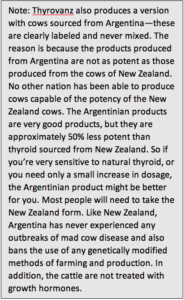That’s when it’s good to know about natural alternatives. And it’s good to know how to take these alternatives, as they can affect you differently than synthetic treatments. And there could even be some differences in the way you respond to natural treatments. Let me explain—
As I’ve explained in the past, it’s pretty common for thyroid blood tests to come back normal. This can be extremely frustrating, as many people with an underperforming thyroid do test normal. But what is normal? You may have so-called “normal” levels, but those levels might not be high enough for your body. You may need more thyroid hormone than your body is producing, even though you’re producing enough for the average person. And most doctors won’t give you a thyroid hormone if you have normal levels.
Even though this condition is fairly common, mainstream medicine is only now beginning to recognize it and the need for treatment. So if your doctor acknowledges that you have symptoms, but still won’t treat you, what can you do?
There are a growing number of doctors who will give support to patients with normal blood levels and are symptomatic. However, that number is still very low. So, to anyone who has symptoms but can’t get help from a doctor: It’s time to look at alternatives.
Start With Iodine
Before you take any other thyroid treatment, I always suggest taking iodine, particularly if your thyroid blood levels are normal. Your thyroid gland requires iodine to function properly. Because of all the bromide and fluoride in our food and water, we don’t absorb enough iodine to fuel the thyroid optimally. Many commercial bread and baked goods manufacturers use potassium bromate as an additive in their products, which has been a huge contributor to bromide overload in our country. And fluoride is in our water and toothpaste. Since the same receptors in our cells absorb iodine, bromide, and fluoride, the overload pushes out the iodine.
So the first step when you have thyroid symptoms is to make sure you’re taking enough iodine. There’s only one iodine supplement on the market that I recommend. Guy Abraham developed Iodoral after years of research on iodine and the thyroid. Iodoral is still the best absorbed iodine supplement on the market.
Even if iodine supplementation doesn’t fully fix your symptoms, it’s advisable to continue taking it with your thyroid treatment. It may help you reduce the dose, and it will help your thyroid function at peak performance.
Other Alternatives
The two most common natural thyroid treatments are Armour and Nature-Throid. Both of these products can work very well. I’ve taken Nature-Throid and seen great results with it. Many people who don’t respond to synthetics respond very well to one of these products. However, there are two problems with both of these. The first problem is that you must see a doctor in order to get them. If you’re in the normal range and your doctor won’t help you buy these, you won’t be able to get either one. You’ll also have to phone your doctor every time your refill needs renewing.
Second, most people don’t realize that all commercial desiccated thyroid extract comes from pig thyroids—all of them, that is, except for one. I’ll tell you about it in a moment. Prior to the 20th century, most forms of natural thyroid came from the thyroid glands of cows. Then, in the early 1900s, the Armour meat company, in an effort to use every part of the pigs they harvested, jumped into the thyroid treatment business. The company began marketing its own natural desiccated thyroid from pigs, known as Armour Thyroid. And every desiccated thyroid extract since then has been made from pig thyroid.
There are a lot of people who don’t eat pork, and want to completely avoid it in their diet. Others are allergic to porcine products. For these folks, their only option is the synthetic treatment.
A Better Option
Until recently, there wasn’t an over-the-counter product you could use to treat an underperforming thyroid. However, I found one a few years ago that’s quite impressive. The manufacturers of Thyrovanz™ use only natural desiccated thyroid glandular from New Zealand cows (not pigs). This is extremely important for a few reasons.
 First, pigs are omnivores and eat just about anything, including other pigs, meat, and garbage. They are the vacuum cleaners of the farm, and eat just about anything. Cows, on the other hand, have a much better diet. They’re vegetarians, so they eat plants, including grass, hay, weeds, corn and other grains (if they have access to them), and flowers.
First, pigs are omnivores and eat just about anything, including other pigs, meat, and garbage. They are the vacuum cleaners of the farm, and eat just about anything. Cows, on the other hand, have a much better diet. They’re vegetarians, so they eat plants, including grass, hay, weeds, corn and other grains (if they have access to them), and flowers.
Second, New Zealand doesn’t allow any genetically modified methods of farming or production. So you know their products aren’t genetically modified. Third, New Zealand has never experienced any outbreaks of mad cow disease, so you know the animals they use are healthy. And finally, the animals are never treated with any growth hormones. So you don’t have to worry about any contamination from outside hormones. Thyrovanz uses only grass-fed cows as well (i.e., no grains), so the quality is top-notch.
What’s more, unlike other quality products, such as Nature-Throid and Armour, you don’t need to see a doctor before buying Thyrovanz in the U.S. (though you will have to see a doctor in some countries). So it’s ideal for anyone who might suspect they have thyroid problems, but their blood tests come back normal.
Even Better Than Other Natural Thyroid Products
Then there’s the additional benefits of Thyrovanz. Consider this: Most synthetics contain just thyroxine (T4). Most natural desiccated thyroid extracts contains both thyroxine (T4) and triiodothyronine (T3), as well as a hormone called calcitonin and other compounds. A normal human thyroid gland produces T4, T3, T2, T1, and calcitonin as well. Thyrovanz produces all of these, including the T2 and T1 hormones.
T1 and T2 are hormone precursors, and byproducts of thyroid hormone synthesis. Most conventional research suggests that they do not act on the thyroid hormone receptor and appear to be totally inert. However, T4 is inert as well. Yet the body is able to use it effectively. The same is true of T1 and T2.
For instance, recent research has found that T2 belongs to the family of iodine-dependent thyroid hormones known as iodothyronines. Because it’s iodine dependent, it’s possible it remains inert until activated by iodine. Since many people with underperforming thyroid symptoms are iodine deficient, this could explain why research considers this metabolite inert. It’s also why you need to make sure your iodine levels are optimal.
T2 has a direct impact on the mitochondria of the cells, so it rapidly affects mitochondrial respiratory parameters, meaning it directly impacts the metabolism. One study found that T2:
- Increases resting metabolic rate (RMR), despite lower circulating T4 and T3
- Decreases adiposity (both in general and specifically abdominal fat) by increasing fat burning
- Decreases triglycerides and cholesterol levels
- Decreases fatty liver markers
- Reduces diet-related weight gain
- Stimulates glucose consumption and growth hormone
- May relieve some nerve discomfort
- May reverse impairments in mitochondria
- Activates SIRT1 and AMPK – important for healthy aging and preventing insulin resistance
- Improves resistance to cold in those with an underperforming thyroid (in an animal model)
- Increases mitochondrial capacity to import and oxidize fatty acids
There’s not much research on activated T1, but my bet is that once we have that research, we’ll see similar effects. The body produces it for a reason. We just don’t know what it is yet.
What to Expect
Many people who try Thyrovanz see an immediate response. They feel better overnight. Their metabolism works better and their energy levels are up.
Some people don’t see an impact as fast. It might take a few days or even a few weeks. Use the entire bottle and see if it works. If you’re not sure, stop taking it for a couple of days and see if your energy level drops. If it does, then you can be sure it was working for you. Sometimes with supplements you don’t notice a difference until you stop taking them. If you don’t feel as good as you think you should, you may need a higher dose.
Please note: If you’re taking another thyroid supplement and want to try Thyrovanz® instead, talk to your doctor and start with a dose that’s as close to your current dose as possible. There are many different products on the market, and each one is a little different, so there are no exact conversions. For instance, doctors usually prescribe Armour and Nature-Throid in grains – 1 grain of Armour Thyroid is the same as 60 mg, and 1 grain of Nature-Throid is 65 mg. If you’re taking 2 grains of either of these, then you can try 100 mg of Thyrovanz and see if it’s enough. You may need more.
Some people with low thyroid function may see their thyroid return to normal function after taking natural thyroid products. This isn’t the norm, but it does happen. For most people, you’ll have to take the products indefinitely to continue seeing the positive effects. This is why I always recommend Iodoral first, as it may boost your thyroid function without needing the thyroid treatments.
If you decide to take any treatment and then stop taking it for a few days, pay close attention to your energy levels. If they drop, your thyroid isn’t working optimally, and needs continued support.
Again, if you have any symptoms of an underperforming thyroid, including fatigue, cold sensitivity, constipation, dry skin, and unexplained weight gain, then give Thyrovanz a try. You can order Thyrovanz by following this link. Make sure you let me know if it works for you.
Sources:
https://thyrovanz.com/wp-content/uploads/2017/08/Thyrovanz-information-pdf.pdf
https://www.holtorfmed.com/t2-the-lesser-known-thyroid-hormone/
